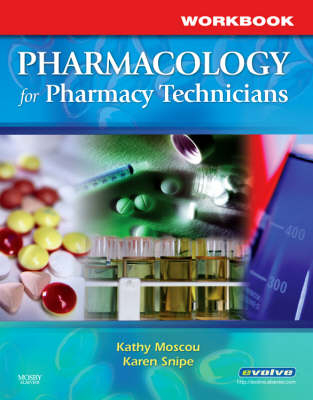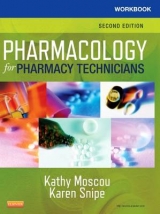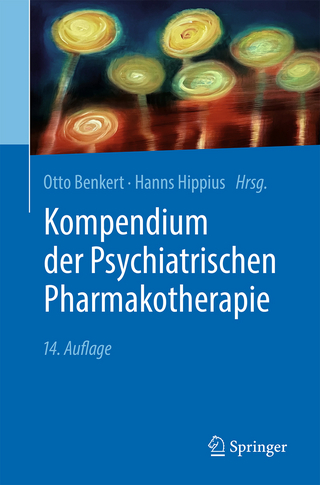
Workbook for Pharmacology for Pharmacy Technicians
Mosby (Verlag)
978-0-323-04721-0 (ISBN)
- Titel erscheint in neuer Auflage
- Artikel merken
Concise content reviews emphasize everything you need to know from each chapter of the textbook.
Each workbook chapter includes 10-20 matching, 12-15 fill-in-the-blank, and 10-15 true/false questions to reinforce and help you evaluate your understanding of key concepts.
Critical thinking exercises challenge you to synthesize information and apply concepts beyond the scope of each chapter.
Research Activities for each chapter strengthen your computing and research skills and introduce you to online sources for information for pharmacology and pharmacy technology.
Dr. Kathy Moscou holds a PhD in Pharmaceutical Sciences and Global Health from the University of Toronto, a master's degree in Public Health / International Health, and a bachelor's degree in Pharmacy from the University of Washington. She is a licensed pharmacist in Ontario, Canada, and Washington state. Her research in pharmacogovernance investigates the relationship between global institutions, state actors, and national health policy for post-market drug safety (pharmacovigilance). Her research also focuses on comparative health policy and models of governance that address equity in drug safety and foster healthy communities. Dr. Moscou has nearly 40 years of experience as a pharmacist and more than 10 years of experience teaching in pharmacology and specifically to pharmacy technician students; she is an adjunct professor in the Faculty of Health Sciences at Brock University in Ontario. Also a talented artist, she recently joined the faculty of The Ontario College of Art & Design University (OCAD U) as Assistant Professor. Karen Snipe, CPhT, MA Ed, is the Student Liaison for the Division of Health Sciences at Trident Technical College in Charleston, South Carolina, where she served as an instructor and Pharmacy Technician program director for more than 20 years. Ms. Snipe worked in institutional pharmacy practice for a decade before pursuing a master's degree in healthcare education. She has ben an active member of the Pharmacy Technician Educators Council (PTEC) for the last two decades and a member of the Pharmacy Technician Accreditation Commission (PTAC).
Unit 1: Introduction to Pharmacology
1.Fundamentals of Pharmacology
2.Principles of Pharmacology
3.Pharmacodynamics
4.Drug Interactions and Medication Errors
Unit 2: Drugs Affecting the Autonomic Nervous System and Central Nervous System
5.Treatment of Anxiety
6.Treatment of Depression
7.Treatment of Schizophrenia and Other Psychoses
8.Treatment of Parkinson's Disease and Huntington's Disease
9.Treatment of Seizure Disorders
10.Treatment of Pain
11.Treatment of Migraine Headache and Alzheimer's Disease
12.Treatment of Sleep Disorders and Attention Deficit Hyperactivity Disorder
Unit 3: Drugs Affecting the Musculoskeletal System
13.Neuromuscular Blockade
14.Treatment of Muscle Spasms
15.Treatment of Autoimmune Diseases That Affect the Musculoskeletal System
16.Treatment of Osteoporosis and Paget's Disease of the Bone
17.Treatment of Hyperuricemia and Gout
Unit 4: Treatment of Diseases of the Ophthalmic and Otic Systems
18.Treatment of Glaucoma
19.Treatment of Vertigo and Other Disorders of the Ear
20.Treatment of Ophthalmic and Otic Infections
Unit 5: Drugs Affecting the Cardiovascular System
21.Treatment of Angina
22.Treatment of Hypertension
23.Treatment of Heart Failure
24.Treatment of Myocardial Infarction and Stroke
25.Treatment of Arrhythmia
Unit 6: Drugs Affecting the Gastrointestinal System
26.Treatment of Gastroesophageal Reflux Disease, Laryngopharyngeal Reflux and Peptic Ulcer
27.Treatment of Irritable Bowel Syndrome, Ulcerative Colitis and Crohn's Disease
Unit 7: Drugs Affecting the Respiratory System
28.Treatment of Asthma and Chronic Obstructive Pulmonary Disease
29.Treatment of Allergies
Unit 8: Drugs Affecting the Urinary System
30.Treatment of Prostate Disease and Erectile Dysfunction
31.Treatment of Fluid and Electrolyte Disorders
Unit 9: Drugs Affecting the Endocrine System
32.Treatment of Thyroid Disorders
33.Treatment of Diabetes Mellitus
34.Drugs That Affect the Reproductive System
Unit 10: Drugs Affecting the Immunological System
35.Treatment of Bacterial Infection
36.Treatment of Viral Infections
37.Treatment of Cancers
38.Vaccines and Immunosuppressants
Unit 11: Drugs Affecting the Integumentary System
39.Treatment of Fungal Infections
40.Treatment of Decubitus Ulcers and Burns
41.Treatment of Acne
42.Treatment of Eczema
43.Treatment of Lice and Scabies
| Erscheint lt. Verlag | 22.5.2008 |
|---|---|
| Verlagsort | St Louis |
| Sprache | englisch |
| Maße | 216 x 276 mm |
| Themenwelt | Medizin / Pharmazie ► Gesundheitswesen |
| Medizin / Pharmazie ► Medizinische Fachgebiete ► Pharmakologie / Pharmakotherapie | |
| Medizin / Pharmazie ► Pflege ► Palliativpflege / Sterbebegleitung | |
| ISBN-10 | 0-323-04721-1 / 0323047211 |
| ISBN-13 | 978-0-323-04721-0 / 9780323047210 |
| Zustand | Neuware |
| Informationen gemäß Produktsicherheitsverordnung (GPSR) | |
| Haben Sie eine Frage zum Produkt? |
aus dem Bereich



